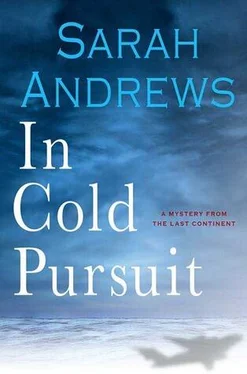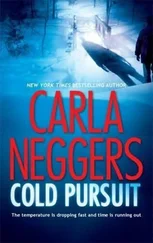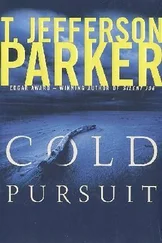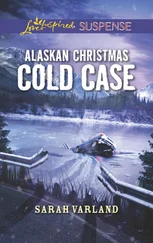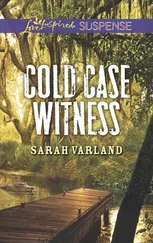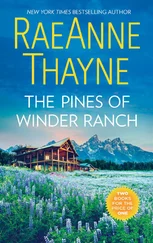“Oh, great! Maybe I can talk to them.”
Cupcake said, “Sure, you can go over to Mac Ops and give Dan a whistle.”
“What’s Mac Ops?”
“The radio relay station. It’s right over there—that building with all the antennas on it, upstairs from the Airlift Wing, next to the weather station. They monitor all frequencies around the clock, and each field camp has to check in at least once out of the twenty-four.”
“How far away is the U Maine field camp?”
“Out in the Dry Valleys somewhere. Under an hour, by helicopter.”
“Can I maybe hitch a ride out there?”
Cupcake laughed sardonically. “No, you can’t. Between NSF building the new South Pole Station and Raytheon trying to make a profit, things have gotten screwed down so tight you can hear their assholes squeak. Used to be you could hitch a ride anywhere they had an empty seat, but those days are gone.”
Valena said, “Okay, so there were two grad students in Emmett’s camp last year, and of course Emmett himself. That’s three. Who else?”
Ted continued counting on his fingers. “Sheila Tuttle, that’s your cook, an Aussie. She’d be Raytheon. She’s up at Black Island this year. Good place for her. She’s kind of a grouch.”
“There was a cook?”
“Hard work, those high-altitude camps. You need someone looking after the calories. Of course, she had other duties as well. Nobody in a field camp ever finds himself with time on his hands unless it’s storming, and then you just try to catch up on your sleep.” He went back to his count. “I borrowed David from Fleet Ops to help me with the machinery. So he was Raytheon, too. Then there was William what’s-his-name, the dogsbody, also Raytheon.”
“Dogsbody?”
“The Boss sent him along to do some heavy lifting.” He started his counting over again with his thumb. “Manuel Roig, mountaineer; Raytheon. They sent him in with Sweeny to babysit, keep him out of trouble. Hah. Calvin Hart, who was Emmett’s helper, so I guess you can put him on the grantee list. I think he’s out in deep field helping with the drill for the WAIS Divide project.”
Cupcake said, “Oh, yeah, Cal. Wasn’t a scientist or anything, more like a ski bum, but Emmett said he was a good guy to have around. He told me, ‘He’ll do anything I tell him to and he doesn’t complain when it gets cold.’ Contrast that to Schwartz and Lindemann, who are both whiners.”
“That’s eight,” said Valena, making a mental note to keep her complaints to important things, like, My leg just fell off.
“There were nine, aside from me, and like I said, I was gone before it happened, so who did I forget?” He stared at the ceiling, tapping a ninth finger. “Oh yeah, the deceased. Though of course he wasn’t dead when he got there.”
“He had a name,” said Cupcake. “Morris Sweeny.”
Ted gave her a look. “You’d know?”
“Yeah. I’d know.”
Ted put his lips together and whistled. “You don’t miss a chance, do you?”
“Am I missing something?” Valena inquired.
Ted glanced her way. “Our Dorothy’s telling us she played a little Wizard of Oz with the man.”
Cupcake shrugged. “He was okay. Nothing great.”
“So how come Mr. Sweeny died?” Valena asked, steering the discussion away from what either was or was not great about the reporter’s capacities in bed.
Ted took another good guzzle. “The guy arrived on schedule, but Emmett had been delayed getting started and was still out in the mountain camp. Emmett wanted to have him on the ice sheet, out at WAIS Divide, not up at altitude.”
Cupcake cut in again. “I don’t get what that WAIS project is all about. And what’s up with the acronym? Everybody’s got to have a goddamned acronym around here.”
Valena said, “It stands for West Antarctic Ice Sheet. They’re setting up to drill a continuous core, or sample, of the ice.”
“I don’t know what you want with all that ice,” said Cupcake.
Without thinking, Valena shifted into science teacher mode. “The ice is made up of snow that fell a long time ago, trapping some air with it. So we collect a core, a long cylinder that goes from the top of the ice sheet to the bottom. Ice has layers, one for every year, just like tree rings. If you know what you’re doing you can read the layers just like you’re reading the pages of old weather reports.
“I was just jerking your chain,” said Cupcake. Don’t you guys have enough cores? The Russians got one at Vostok. I read the newspapers, and I’ve seen Al Gore’s movie. You look at the C O2in the core and it gives you the temperature.” She made a horizontal zigzag through the air, mimicking the classic illustration of rises and falls in C O2and temperature, then threw the sharp rise onto the end, indicating the spike of CO2and corresponding rise in temperature with modern burning of fossil fuels. “So we’re all going to hell in a handbasket. Why blow a gazillion more dollars drilling another core?”
Valena shook her head in frustration. “Vostok is on the East Antarctic Ice Sheet. This continent is huge! Would you look in Cincinnati if you were trying to find out what the climate was like in Las Vegas? We need as much information as you can get from as many places as we can get so we can continue to refine the climate models. We know from Greenland cores that the climate has changed many times, and quickly. Ten degree changes in a time period of as little as ten years. Like as if you moved from Los Angeles to San Francisco or Atlanta to Pittsburgh.”
“Climate changes happen that quickly?” asked Ted.
“Yes. The variables that change climate—like change in the amount of sunlight reaching the earth’s surface, or the level of greenhouse gases—build up and up and up, and it looks like not very much is happening, but then the climate system crosses a threshold and bang, it’s a new game, like flicking a switch. The ocean currents flip to a new circulation pattern and ecosystems either adapt or die. If changes like we’ve seen in the cores happen today there will be huge social impact until our water and agricultural system gets back in synch with the new climate.”
“We’d be fighting over every single resource,” said Cupcake.
“Right,” said Valena. It doesn’t help that we’re doing a global-scale experiment by increasing greenhouse gas and altering the thermal balance of the earth. We could be pushing toward one of those thresholds.”
Everyone was quiet for a moment. Then Ted said, “I don’t like being part of that experiment. I mean, good planets are hard to come by.”
Valena said, “And we drill here because this is where most of the ice is, and because it’s important to understand whether global climate changes start in the Arctic or the Antarctic. There are ice core records from Greenland that go back 104,000 years; that’s pretty good, but we can do better here. We want to see how climate changed in the past when the amount of greenhouse gasses changed, so we need an Antarctic ice core from a place where it snows a lot—like right smack in the middle of the West Antarctic Ice Sheet—so we can read the years.”
Ted said, “But why put the WAIS project out on the divide? It has the worst weather in Antarctica. It’s a logistical nightmare to get the drill and all the housing and everything in there.”
Valena said, “The worse the weather, the more snow accumulates, and the more snow, the better we can read the annual bands in the ice, and better we can refine the gas and isotope analyses.”
Cupcake said, “You’re stalling again, Ted. So it was WAIS that the reporter was supposed to see, not the high-elevation camp. But they were still setting up the drill last year at WAIS and building the covering structure. What was he going to do out there?”
Читать дальше
